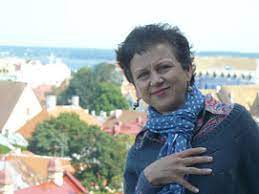The AABS 2022 Conference will look toward the future to explore how the Baltic States will move forward into the next century, as a crossroads between Europe and Asia, Nordic and Eastern Europe. Similarly, the field of Baltic Studies is at a crossroads between new and old diaspora communities negotiating the implications of what it means to advance the study and research of the Baltic States into the next century. The conference will promote intersections of academic disciplines, scholarship, and community by focusing on the implications for the Baltic States in the future at the crossroads of different regions, cultures, religions, and historical perspectives. Please find more information here, and registration here.
Vilma Žydžiūnaitė (PhD in Education, Kaunas University of Technology, and PhD in Nursing, Tampere University) is Professor of Education at Vytautas Magnus University in Kaunas and Professor of Nursing at Klaipėda State University of Applied Sciences, as well as Director of the Institute of Educational Research, Vytautas Magnus University.
Professor Žydžiūnaitė is co-chair of the Education, Digital Humanities, and Technology division at AABS 2022. AABS met with her to discuss the division and what she’s looking forward to at the conference. The transcript of our conversation has been lightly edited for clarity and length.

AABS: To start, can you give us a brief overview of your division and what it will cover? What’s new this year, compared to past years?
VŽ: One of the novelties this year will be the added topic of Education. We will be addressing it through different lenses, societal, political, historical, as well as seeing it in a traditional way. This is not a conference on didactics, of course, but we will be seeing Education through managerial processes like leadership, and seeing the subject through teachers’ perspectives. Teachers are one of key actors in schools, and from a broader view, are key actors in society at large.
AABS: What would you highlight as strengths of the panels in your division?
VŽ: Just from seeing the titles of proposals, I can say that they form a multi-directional and complex view with regards to human resources, management, IT, education, etcetera, through both research-based and theoretical views. What is very strong here is that most of the proposals were based on empirical evidence. I believe this has a great impact on discussion and on developing and broadening discourse on the panel topics.
AABS: What role do the panels serve in the global conversation?
VŽ: I’ve known AABS’s work for years and observed its activities, and I can say one strength we have already is the prevalence of the Baltic view. It means connecting people from the Baltic states, and not just from the motherlands, but from all over the world, keeping these people together and stimulating their discussions. This can highlight important questions which are difficult to discuss in other formats. So here, when people are together, researchers, practitioners, whoever wants to come, it’s a great opportunity to raise uncomfortable questions and receive a discourse of answers. These answers may not keep us in our comfort zone, but rather stimulate our thinking by asking new questions. I believe that this is a strong trait of AABS conferences.
Nowadays, we speak a lot more about a multidisciplinary view. It means that we cannot be disconnected from educational, managerial, and other points of view, from either practical or research sides. We’re trying to transform the point of view and broaden themes, ones which are not traditionally rooted in historical, sociological, and other points of view. I believe sometimes it’s hard to say what effect research and science has on everyday life, or what that work represents. Here, we meet a lot of multidisciplinary questions and answers. Only when we’re together, when people are seeing and discussing these focuses and questions, here maybe there are not full answers, but it can be the start of an objective, respectful discussion, where nobody and nothing is ignored.
For example, the field of Education: it’s not only pedagogy, it’s related to policy and multidisciplinary things. We don’t only speak about didactics, but we speak about political decisions which are impossible to reach without educational input.
Tradition is ok, as long as people keeping the tradition are open to novelties and changes. This is one of the great characteristics of AABS: the flexibility and adaptability.
AABS: What are you excited for at the conference?
VŽ: AABS, for me, every time, is an event! It’s where I meet old friends, where I meet new ones, where I really know for sure that keynote speakers will be surprising and stimulating. I enjoy the discussions and being a part of everything. This is my first time co-chairing, and it’s a huge honor to be able to serve and to give back to the AABS community. I strongly believe that community makes us strong.
